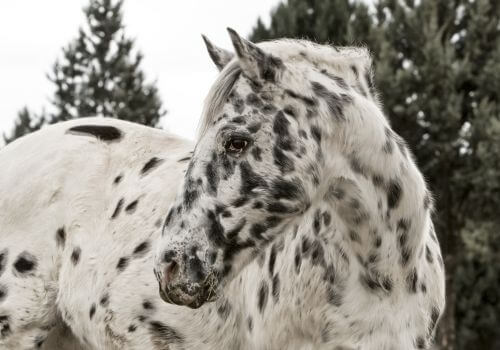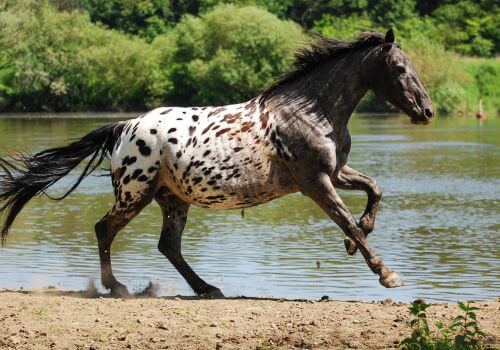The Appaloosa: A Spotted Wonder!
- Weight: 950 to 1,200 pounds
- Height: 14.2 hands (56.8 inches) to 16 hands (64 inches)
- Body Type: Compact, muscular build; colorful coat patterns with mottled skin; striped hooves; white sclera; sparse mane and tail
- Best For: Owners and riders of all levels, including children
- Life Expectancy: 30 years

The Fascinating History of the Appaloosa
The Appaloosa horse's history dates back to the early 1600s when Spanish explorers brought them to North America. The Nez Perce tribe in the Pacific Northwest bred these horses for their intelligence, agility, and unique coat patterns. Renowned for their loyalty and versatility, Appaloosas were used as both war horses and everyday companions.
The breed nearly faced extinction in the late 1800s due to U.S. government policies affecting Native American lands. However, the breed saw a resurgence in the 1930s, leading to the establishment of the Appaloosa Horse Club in 1938, now one of the world’s largest horse breed registries.
What Sets Appaloosas Apart?
Appaloosas are known for their eye-catching coat patterns, which include spots, blankets, and roan variations. They also have mottled skin, striped hooves, and white sclera around the eyes, which are unique traits among horse breeds. They are gentle, intelligent, and highly trainable, making them suitable for riders of all levels.
How Big is an Appaloosa?
The Appaloosa typically stands between 14.2 and 16 hands tall and weighs between 950 and 1,200 pounds. Their strong, muscular bodies provide them with endurance and agility, making them excellent working, riding, and performance horses.

The Appaloosa’s Amazing Coat Patterns
Appaloosas come in a variety of coat colors, including bay, black, chestnut, palomino, dun, and roan. The breed is most famous for its spotted coat patterns, such as:
- Blanket: White over the haunches, with or without spots.
- Leopard: White body with dark spots.
- Snowflake: Dark body with white spots, often concentrated over the haunches.
- Marble/Varnish: Mottled white and dark hairs creating a marbled effect.
Appaloosas also have striped hooves, a trait not commonly found in other horse breeds.
What Were Appaloosas Bred For?
The Appaloosa is an incredibly versatile horse used for many disciplines, including pleasure riding, long-distance trail riding, cattle work, rodeo events, and racing. The breed is also popular in film and television, featuring in classic Westerns like El Dorado and True Grit.
Diet and Nutrition of the Appaloosa
Appaloosas require a well-balanced diet consisting of fresh grass, quality hay, grains, and the occasional fruit or vegetable as a treat. Since they may not always have access to nutrient-rich pasture, vitamin and mineral supplements may be necessary to maintain optimal health.
Common Health Issues of the Appaloosa
Appaloosa horses can be affected by numerous health issues, with the most common affecting their eyes and skin. Appaloosa's are most commonly affected by:
- Equine Recurrent Uveitis (ERU): A common eye disease-causing inflammation that can lead to blindness.
- Congenital Stationary Night Blindness (CSNB): A genetic disorder causing poor night vision, often present from birth.
- Sun Sensitivity: Horses with lighter coat patterns may experience sunburn, particularly on pink skin areas.
According to research, the leopard complex coat pattern is the variety genetically-linked to the conditions, like ERU and CSNB, that can cause blindness.
Grooming and Care of Your Appaloosa
Regular grooming is essential for Appaloosas, especially those with lighter-colored coats that are prone to staining. Daily brushing keeps their coats healthy, and frequent hoof cleaning prevents infections, allowing them to stay in top shape.
Horses with pink skin should be protected from excessive sun exposure using fly masks, UV-resistant sheets, or equine-safe sunscreen. This is a crucial component of their care, as Appaloosa's are at risk for developing skin cancers like squamous cell carcinoma.
Bringing It Back to the Barn
The Appaloosa is a truly distinctive and cherished breed, known for its striking coat patterns, intelligence, and versatility. Whether as a reliable companion, a working ranch horse, or a show-stopper in competition, this breed continues to captivate equestrians and horse lovers worldwide.
